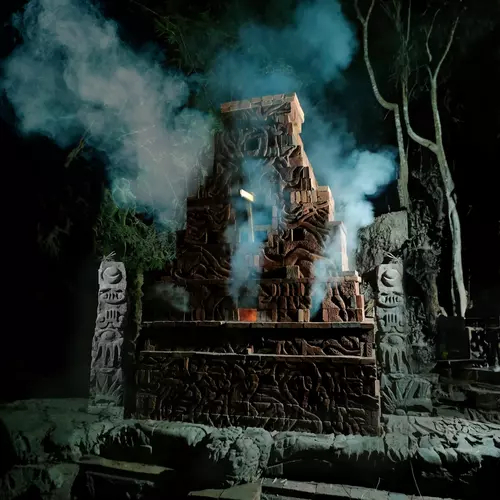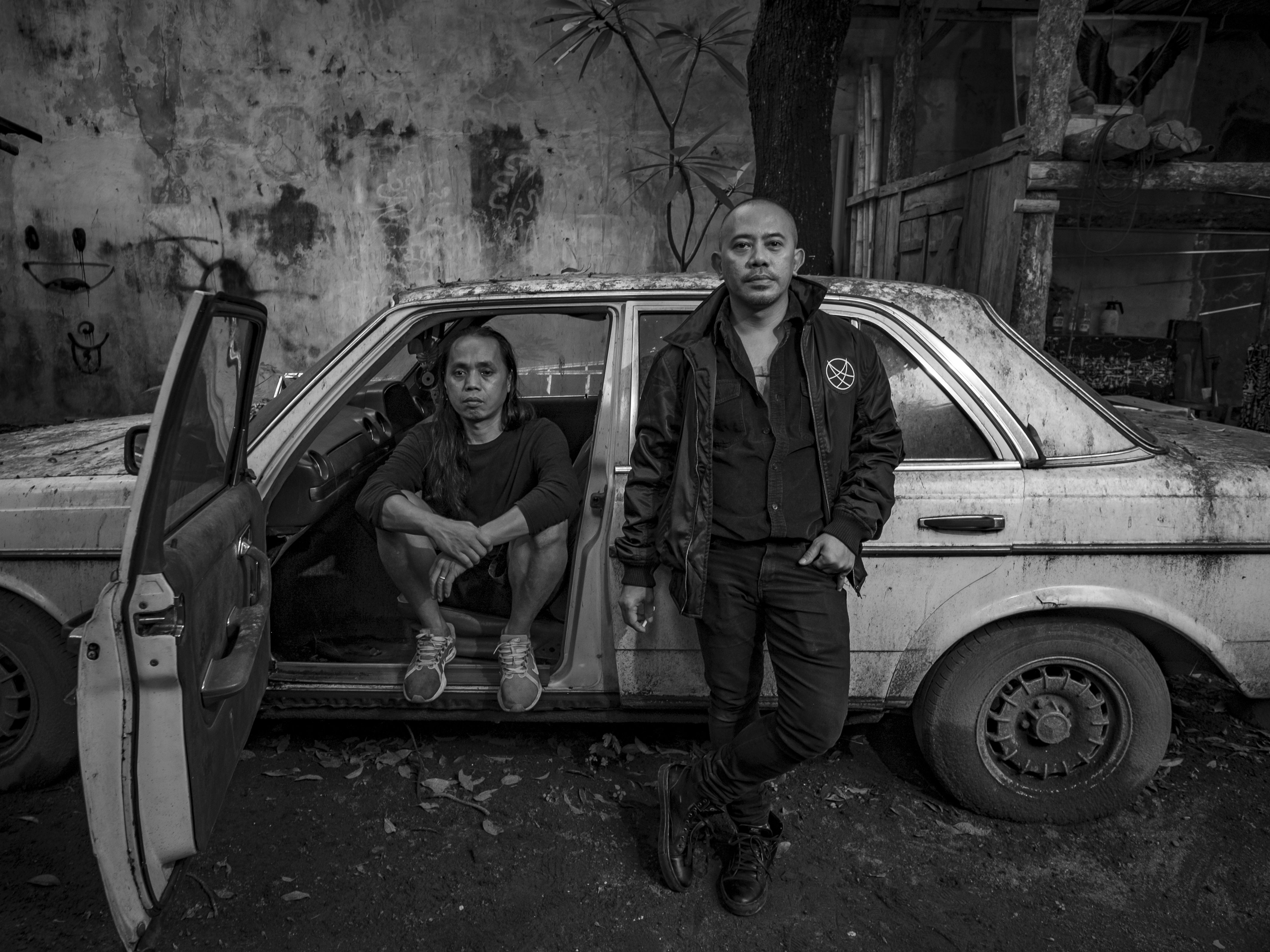
Vajranala
Senyawa
| Formats | Tracks | Price | Buy |
|---|---|---|---|
| 12" Vinyl Album | 6 tracks | £40.00 | Available 14 June 2024 |
| Download Album (MP3) | 6 tracks | £5.94 | |
| Download Album (WAV) | 6 tracks | £5.94 | |
| Download individual tracks | From £0.99 | ||
More information about preorder releases
Description
Senyawa - Vajranala
Vajranala - the new album from Senyawa, out 14th June 2024 via The state51 Conspiracy
Vajranala sees the Indonesian experimental duo of vocalist Rully Shabara and multi-instrumentalist Wukir Suryadi explore how, over centuries, the natural world has shaped our society, the knowledge systems from which power derives, and why that still resonates today. It’s an exercise in understanding the root of the power (knowledge) discussed in their 2021 release Alkisah. When it comes to ‘power’, says Senyawa vocalist Rully Shabara, “people will normally think of someone political, but I don’t think that’s the case. The origin of power goes deeper than that.” It’s the shamans, he says, who were the first possessors of power: “If you’re in a village, if you’re considered to have the knowledge to connect people with the realm of the gods, then you will have power before the leader. It’s very fundamental to explore this.”
Further to this, Vajranala is a collection of multidisciplinary works that reinterpret the mythology of the land where the Brojonalan Temple (also known as the Pawon Temple) stands. The work is also accompanied by an installation in the form of a stone relief that is placed on the ground where it was created, serving as an artefact for the future.
LP
+ Black 180g 12" double vinyl w/ etched side D
+ Lyric zine


The Brojonalan Temple is located in Borobudur Village, Borobudur District, Magelang Regency, 2 km to the northeast of Borobudur Temple and 1 km to the southeast of Mendut Temple. Situated amidst a trio of temples, between Mendut and Borobudur, the Brojonalan Temple holds many narratives based on varied interpretations. One of these narratives suggests that Brojonalan Temple serves as the gateway to ascending a high level of sanctity, forming an imaginary straight line. The selection of these temple locations follows the guidance of the Orion constellation, or "Lintang Waluku" in Javanese, which signifies the beginning of the planting season. In another narrative, the Brojonalan Temple is often perceived to still harbour a wealth of ancient knowledge deserving of further attention, starting from its geographical position, soil and rock composition, reliefs, to its sacred symbols.
The first half of the album should technically be viewed as a single song split into three acts, each representing one strand. The first, for example, refers to Pawon’s connection with the star system. There is a theory that Pawon was constructed to align with Orion’s Belt, or ‘lintang waluku’ in Javanese. The appearance of lintang waluku, Shabara explains, would traditionally signify the beginning of the planting season, which Senyawa references in the third song ‘Kaca Benggala’. To reflect this, multi instrumentalist Wukir Suryadi took a ‘luku’ (traditional Indonesian plough) and transformed it into a giant and careening bowed instrument; for recording, they made a more compact recreation.
In tandem with the recorded album Senyawa undertook the creation of the Vajranala Monument, a 21st-century artefact standing 3.5 metres tall and 2.8 metres wide with a thickness of 2.4 metres, made up of 4100 pieces of carved red brick, surrounded by 26 carved andesite stones. The monument possesses a feature that can emit fire and is built with the hope of becoming a knowledge artefact for humans in the future.

Photo credit: Arnold Simanjuntak
Live
28.08 ICA, London UK
30.08 - 01.09 End of the Road Festival, Dorset UK
30.08 - 01.09 Supersonic Festival, Birmingham UK
--
Instagram
Twitter
Facebook
Vajranala sees the Indonesian experimental duo of vocalist Rully Shabara and multi-instrumentalist Wukir Suryadi explore how, over centuries, the natural world has shaped our society, the knowledge systems from which power derives, and why that still resonates today. It’s an exercise in understanding the root of the power (knowledge) discussed in their 2021 release Alkisah. When it comes to ‘power’, says Senyawa vocalist Rully Shabara, “people will normally think of someone political, but I don’t think that’s the case. The origin of power goes deeper than that.” It’s the shamans, he says, who were the first possessors of power: “If you’re in a village, if you’re considered to have the knowledge to connect people with the realm of the gods, then you will have power before the leader. It’s very fundamental to explore this.”
Further to this, Vajranala is a collection of multidisciplinary works that reinterpret the mythology of the land where the Brojonalan Temple (also known as the Pawon Temple) stands. The work is also accompanied by an installation in the form of a stone relief that is placed on the ground where it was created, serving as an artefact for the future.
LP
+ Black 180g 12" double vinyl w/ etched side D
+ Lyric zine


The Brojonalan Temple is located in Borobudur Village, Borobudur District, Magelang Regency, 2 km to the northeast of Borobudur Temple and 1 km to the southeast of Mendut Temple. Situated amidst a trio of temples, between Mendut and Borobudur, the Brojonalan Temple holds many narratives based on varied interpretations. One of these narratives suggests that Brojonalan Temple serves as the gateway to ascending a high level of sanctity, forming an imaginary straight line. The selection of these temple locations follows the guidance of the Orion constellation, or "Lintang Waluku" in Javanese, which signifies the beginning of the planting season. In another narrative, the Brojonalan Temple is often perceived to still harbour a wealth of ancient knowledge deserving of further attention, starting from its geographical position, soil and rock composition, reliefs, to its sacred symbols.
The first half of the album should technically be viewed as a single song split into three acts, each representing one strand. The first, for example, refers to Pawon’s connection with the star system. There is a theory that Pawon was constructed to align with Orion’s Belt, or ‘lintang waluku’ in Javanese. The appearance of lintang waluku, Shabara explains, would traditionally signify the beginning of the planting season, which Senyawa references in the third song ‘Kaca Benggala’. To reflect this, multi instrumentalist Wukir Suryadi took a ‘luku’ (traditional Indonesian plough) and transformed it into a giant and careening bowed instrument; for recording, they made a more compact recreation.
In tandem with the recorded album Senyawa undertook the creation of the Vajranala Monument, a 21st-century artefact standing 3.5 metres tall and 2.8 metres wide with a thickness of 2.4 metres, made up of 4100 pieces of carved red brick, surrounded by 26 carved andesite stones. The monument possesses a feature that can emit fire and is built with the hope of becoming a knowledge artefact for humans in the future.

Photo credit: Arnold Simanjuntak
Live
28.08 ICA, London UK
30.08 - 01.09 End of the Road Festival, Dorset UK
30.08 - 01.09 Supersonic Festival, Birmingham UK
--
Tracklisting
12" Vinyl Album (CON970LP)
- Alnilam
- Vajranala
- Kaca Benggala
- Kaca Benggala II
- Vajranala II
- Hikmah
Download Album (CON970)
- Alnilam
- Vajranala
- Kaca Benggala
- Kaca Benggala II
- Vajranala II
- Hikmah